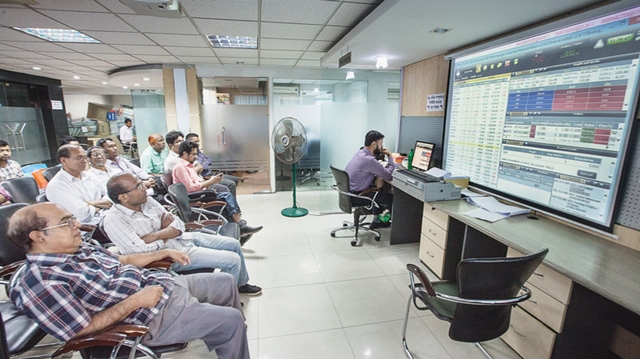SAM
Published:2019-12-08 03:30:55 BdST
Banks turning away from investing in share market
FT ONLINE
Banks' investment in the stock market has been declining gradually since 2016.
Bearish price indices eroded the profit margin of portfolio investment, prompting banks to cut their stock market exposure.
Bangladesh Bank data revealed that banks' investment in the stock market came down to 14 percent in June this year, which was 20 percent in December 2016.
However according to the Bank Company Act, the maximum allowable limit to invest in the capital market is 25 percent of capital on a solo basis, while on a consolidated basis the limit is 50 percent.
Solo basis means an investment of only banks and a consolidated basis means an investment of banks and their subsidiaries.
On a consolidated basis, the banks' investment in the stock market declined to 25 percent in June this year from 32 percent in 2016, according to the central bank's data.
In 2010, the banks' overexposure contributed to a boom in price indices in the capital market. And the banks were allowed to invest 10 percent of their liabilities. Later, the government amended the Bank Company Act in 2013, limiting the banks' exposure to 25 percent.
The banks got three years to limit their overexposure until July 2016. Since then, the banks' investment continued to decline, reducing their share to total market capitalization – the market value of a publicly-traded company's outstanding shares.
The banks' share in the market cap declined to 15 percent or to Tk55,000 crore in July this year from 29 percent or Tk100,000 crore in 2010 when there was a boom in the market.
The Bangladesh Bank, which once was tough on the banks' portfolio investment, is now providing an incentive to encourage the banks to invest in stocks.
In September, the central bank offered liquidity support to the banks at only 6 percent interest to invest in shares.
The Bangladesh Bank issued a circular to temporarily increase the supply of liquidity in the capital market for six months. The liquidity support will be provided through repo.
Despite this lucrative offer, the bank's response was poor as only one bank has taken Tk50 crore liquidity support from the central bank to invest in shares.
When contacted, an official at the central bank explained that the banks' exposure reduced due to a fall in price indices. As banks' investment in shares is calculated based on market price, exposure came down amid down pressure of price indices.
However, it created more room for banks to invest in the stock, he said.
Though there is enough room for banks to invest in shares, banks are reluctant to go to the stock market in the face of huge loss, said Syed Mahbubur Rahman, managing director of Mutual Trust Bank.
In nine months of the current year, Islami Bank's operating income from share investment was Tk125 crore, 16 percent down from the same period of the last year.
The bank made a net loss of around Tk8 crore last year against its portfolio investment of Tk3,800 crore, putting its profitability under pressure.
Islami Bank, having the highest investment in the stock market, almost halved its portfolio size last year from Tk6,000 crore in the previous year in the face of significant profit fall.
Operating income from share investment of NCC Bank fell to Tk3.60 crore in the first nine months of the current year from Tk4.78 crore in the same period of the previous year.
However, some banks saw a leap in operating income from share investment as the overall financial performance of the banking sector was satisfactory in nine months, having a positive impact on the index.
The operating income from share investment of First Security Islami Bank doubled to Tk 62.53 crore in nine months of the current year, for example.
The operating income from the share investment of Shahjalal Islami Bank also doubled to Tk45 crore in nine months, according to the Bank.
In 2018, most of the banks made a huge loss in portfolio investment prompting them to cut investment, according to the central bank data.
The Bangladesh Bank finds a correlation between the share price movement of the banking sector and the market indices.
The Bangladesh Bank's Financial Stability Assessment Report for April-June shows that the banks' share in market turnover and the broad index DSEX of the Dhaka Stock Exchange are moving in the same direction.
The DSEX, in general, is higher when the monthly average call money rate is lower. There is a positive relationship between excess liquidity of the banking system and the DSEX.
The decision of CRR (Cash Reserve Requirement) reduction in early 2018 had a positive impact on the market index, raising the DSEX.
Unauthorized use or reproduction of The Finance Today content for commercial purposes is strictly prohibited.


